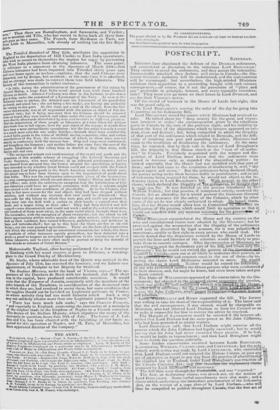The Trinidad Standard of May 23th, attributes the opposition in
England to the deportation of Hill Coolies to East India speculators, who wish to secure to themselves the market for sugar by preventing the West India planters from obtaining labourers. The same paper, in reference to a statement in the Spectator of March 24th—that Chinese labourers had been imported into Trinidad thirty years ago, and sent home again as useless—explains, that the said Chinese were imported, not by design, but accident : at the same time it is admitted, that an attempt was made to convert them into field labourers. The history of this transaction is rather curious— "In 1805 during the administration of the government of this colony by General Hisiop, a large East India vessel arrived here, with three hundred cbioese on board. Admiral Cochrane was then in the harbour, as also was a ril.ship, under the command of a Lieutenant of the Navy. As soan its the fnel'mroan came to anchor, the Admiral sent the Lieutenant of the guard-ship 0S board, and seized her ; she not being a free trader, nor having any author ity for coming to this port. At thin time, not a soul in the island-, front the Go- vernor downwards, was at all acquainted with the nature or object of thin un- espected visit; but it being necessary that the Chinese shoold be removed from on board, they were landed, and taken under the cam of Government, and were shortly afterwards distributed by tens and twenties to different planters. Had the importation of these people as labourers, at a time when the African slave-trade was in full vigour, been the real object of the voyage, it would then have been a most extraordinary speculation : but the live cargo was only a cover to a cinch more valuable one under hatches—beneath these were comfortably stowed India goods to the value of 50,000/. sterlinz—muslins, silks, and cotton manufactures of the East, the introduction of which, in those days, was not txactly in conformity with the revenue law. Ship and cargo were condemned, and brought to the hammer ; and neither before nor since have the eyes of the bumble inhabitants of this colony been so dazzled as they then were, with 'fabrics rich and rare.
"The unexpected seizure and condemnation of the vessel and goods put the promoters of this notable scheme of smuggling (the Colonial Secretary and ;ender Secretary, who were relatives) in at atikward predicament ; and to save himself from personal loss, the former adopted the speculation, an having been intended to try whether Great Britain could not centipete with the United States upon East India goods in the South American market; in which case, this island was to have been thrown open to the importation of goods direct from India. This was the explanation subsequently given of the transitetion, in a long correspondence which mated detween General !fishy and the Colo-
nial Office; and, with the unforttmate exception that the introduction of Chi. nese labourers could have no possible connexion with such it scheme, aught
have carried with it some semblance of plausibility. As to the Chinese, they being in fact mere covers for the real object, they had been shipped without
selection, and without any contract that ever could be discuvel ell they were unfit for the labour to which they were put, and could not perform it. They went into the field with a cutlass in their hand*, a parasol over their heads, and a teapot slang at their sides ! They had been deinsies: aud kid- napped—were discontented, and would not work ; and at the end of six months.
two hundred of them went away, iu the same vessel which brought them here. The remainder, with the exception of about twenty-five, left the island by dif- ferent opportunities within twelve months after their arrival ; whilst those who took up their residence here turned fishermen, pork-butchers, and artificers in horn and tortoishe-shell ; but up to this bout (for there are five or six still living), not one ever pursued agriculture. These are the faets of a transaction with which the colony itself had no intentional connexion, but which, like those of hundreds of other instances equally groundless, has been distorted into a proof—a proof to support an interested opposition to the introduction of East Indian labourers, and to every effiwt made to prevent or delay the downfal of them islands as colonies of Great Britain."


























 Previous page
Previous page